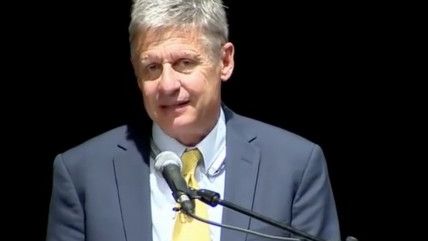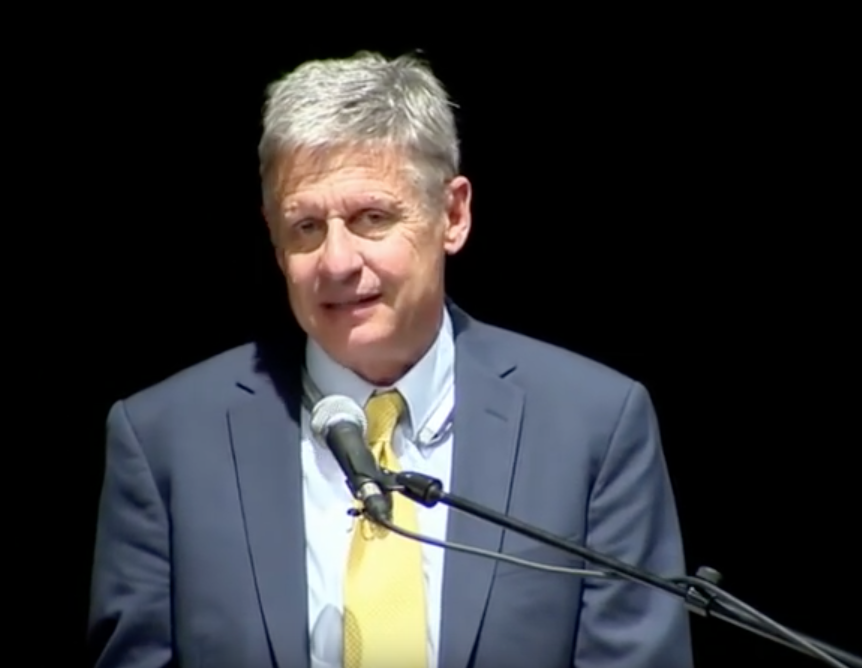Gary Johnson Lays Out a Sane, Coherent, Skeptical Foreign Policy
Libertarian candidate wants Congress to declare wars, interventions to have clearly defined goals, and an end to "War on Terror" victory fantasies.


Gary Johnson laid out a very coherent, sensible, and "skeptical" foreign policy in a speech last week at the University of Chicago. In it, the Libertarian presidential candidate presented a worldview that is stark contrast to both "smart power" in the form of non-stop interventionism favored by Democratic nominee Hillary Clinton or the incoherent thuggery of the pro-torture and "bomb the shit out of ISIS" policies put forth by Republican nominee Donald Trump.
Unfortunately, the speech got very little coverage by the political press, which seems less interested in covering Johnson's actual foreign policy than it is in guffawing over his tough-to-watch "Aleppo" gaffe and other momentary brain farts of questionable significance.
Contrary to the view that libertarian foreign policy tilts toward "isolationism," Johnson invoked Ronald Reagan's maxim of "peace through strength," and noted that he supported military intervention in Afghanistan after 9/11/01. But he expressed dismay that after deposing the Taliban and essentially chasing much of Al Qaeda out of the country, U.S. forces remain in Afghanistan 15 years later.
For these reasons in particular, Johnson as president promised to be "the skeptic in the room" when it comes to "dropping bombs and sending young men and women into harm's way," adding, "I would be the president who would have to be convinced [military intervention] is absolutely necessary to protect the American people or clear U.S. interests."
This alone is a refreshing divergence from the two major party candidates, who never miss an opportunity to make grandiose statements that their particular plan—such as killing ISIS' leaders or bombing their oil reserves—is a fool-proof use of military resources.
Pointing to two instances where U.S. interventions contributed to the deposing of two brutal dictators, but also created power vacuums which left each country far worse off, Johnson said:
As for Iraq itself, well, it is obviously a tragic mess. Saddam was horrible, but is what we replaced him with any better?
Libya. Same song, different verse. We used our military to help overthrow Qaddafi. Again, a bad guy and, by most standards, a war criminal. But what took his place? Did we have a plan? Did we consider the potential consequences, with which we are living today?
I could go on, but the lesson is clear. Is it our fault that chaos has consumed nations such as Afghanistan, Iraq and Libya, or that violent extremists have found homes in the wake of our interventions? No. It isn't our fault alone. We had good intentions, but we intervened with no clear vision of the outcomes, and frankly, with no clear vision as to the overall U.S. interest, which should be the guiding principle.
Unlike Donald Trump, who said he would only defend NATO allies if they contributed enough financially to the alliance, Johnson promised to "honor our commitments," but also noted, "other countries around the world have grown too dependent upon U.S. military power":
The U.S. military exists, first and foremost, to defend the United States and U.S. vital interests. If our actions sometimes help others, that is a useful byproduct. But it shouldn't be confused with the U.S. military's—and the U.S. government's—core mission. Instead, we should expect other countries to defend themselves and their interests. If they did so, they would have greater capabilities for dealing with local problems before they become global ones. We should want more countries who share our values to be acting to defend those values, not paying us to do it for them.
Today, U.S. military spending accounts for roughly one-third of total military spending of the entire world, exceeding the combined total of the next seven largest military budgets including those of Russia and China. Here at home, military spending accounts for almost half of all discretionary federal spending.
U.S. taxpayers are picking up the tab for far too many others around the world, and we simply cannot afford it.
Perhaps most significantly, Johnson has taken the radical view that Congress should do its constitutional duty and be the governmental entity that actually declares wars:
As for authorization, whatever happened to the constitutional notion that Congress should declare wars? The interventions that have cost thousands of lives and trillions of dollars over the past fifteen years have been conducted on the basis of authorizations passed by Congress in the aftermath of 9/11. Congress has since allowed the president to conduct "executive wars" while avoiding their responsibility to place a check—or an approval—on those wars. Yes, they have continued to fund them, but as far as casting the tough votes to drop bombs or deploy our young men and women, Congress has been AWOL.
We need to honor the War Powers Act and force both Congress and the president to only engage in war with a clear authorization from both the Executive and Legislative Branches. As president, I will honor the War Powers Act, without hiding behind dubious legal opinions from my own lawyers.
Johnson concluded with a call to end the "naive and misleading" fantasy that there will ever be a "V-I Day" to celebrate a decisive military victory over ISIS or any other iteration of the "Global War on Terror." His plan for battling Islamic extremism focuses on "isolating" and "containing them," by "starving them of the funds and support they must have to mount large-scale attacks," rather than "dropping bombs" or putting "tens of thousands of boots on the ground."
Johnson concluded his speech by offering this sober assessment of American military power:
We may never know if and when we have won a "War on Terror." It simply isn't that kind of threat, and we need to deal with that reality. And we certainly won't win that war with a foreign policy that continues to contribute to chaos and vacuums of power across the globe.
Read the full text of Johnson's foreign policy speech here and watch video of the speech plus a Q&A with students below:


Show Comments (36)